The views expressed in our content reflect individual perspectives and do not represent the authoritative views of the Baha'i Faith.
No man should follow blindly his ancestors and forefathers. Nay, each must see with his own eyes, hear with his own ears and investigate independently in order that he may find the truth. – Abdu’l-Baha, Divine Philosophy, p. 25.
Now we all face the ever-present reality of more terrorist attacks perpetuated by misguided Muslims intent on raging an infernal fire of religious extremism.
As a response, many media outlets, politicians, and high profile individuals, in the United States and abroad, have fanned the flames of hatred. Understandably, unprovoked terror leads to confusion and fear. Not only does it wreak havoc on countries and peoples with opposing world views, it forces people to take sides; or to ask questions and seek understanding and solutions.
So being an outgoing, approachable, modern, professional Iranian woman, and given my last name, many patients or acquaintances that I encounter daily who do not know my religious beliefs, assume that I am a Muslim. Lately, many ask me a variation on this question: Where do you stand as a Muslim?
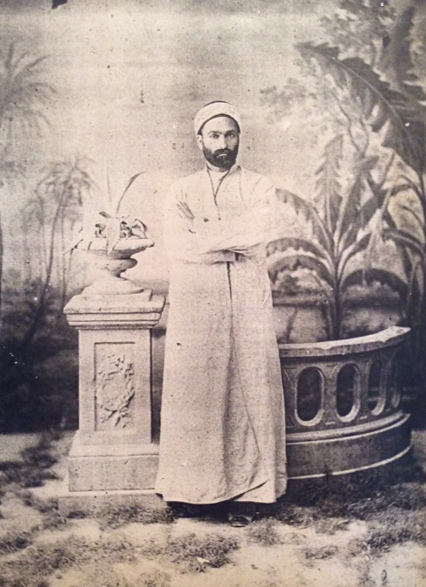
Hoda Hosseini’s paternal Muslim grandfather, who became a Baha’i
Although I am a Baha’i and not a Muslim, my ancestors over a century ago, were indeed Muslims who chose to become Baha’is.
In many conversations with my Iranian Muslim friends and acquaintances over the years; with those whom I’ve became close to as a child growing up in Iran; with those whom I studied with in the U.K.; and with those from the Iranian-American Diaspora I have befriended in the U.S. in the past thirty years; many have reached an impasse over their Muslim identity and its clash with modernity. I empathize and understand their struggles to redefine themselves in view of the changing political landscape within the Middle East, the increasing tempo of the clash of civilizations between Islam and the West, and especially the huge cultural shifts that have taken place since the Iranian Revolution.
The pain of their migration from Iran, as well as constantly enduring negative stereotypes and prejudices engendered by other nationalities and religions, whether on account of the rhetoric of the Iranian clergy and its orchestrated death chants; the Iranian hostage crisis; the despicable and disastrous 9/11 terrorist attacks; the Axis of Evil, the Taliban; Al Qaeda; and now ISIS and Daesh, has made expatriate Iranian Muslims face a collective crisis of conscience.
The world is undergoing profound changes, and since change fundamentally influences our stance on religion and its relevance in our individual and collective lives, I find that many Iranian Muslims must now make hard choices, too. Most don’t feel the freedom to even make a choice. Many are Muslims in name only and don’t practice their Faith any longer, but remain at this impasse because of pressure or the fear of punishment by family or friends. Everyone’s path is unique, but these are a few of the broadly defined paths expatriate Muslims often take at the crossroads:
- Some choose to accept atheism and join one of the fastest growing beliefs in the U.S.: No God/No Religion.
- Some choose to accept God but turn away from all forms of organized religion, and identify themselves as “spiritual but not religious.”
- Some choose to continue to identify as Muslim. Oftentimes, not only do many of those who make this choice feel ashamed because of what has been done in the name of Islam, they feel betrayed and hopeless. Their struggle to continue identifying as Iranian Muslims has to do with several additional interlocking issues since the inception of the Islamic Republic of Iran that reflects the systemic corruption of their power-hungry clergy; the hypocrisy among their leaders and the power they hold over their citizens; the relentless killing and murder of dissenters particularly that of the youth; the unbridled fanaticism among zealots; and the constant call for violent jihad.
- Some choose a path forward to investigate, accept and embrace a new Faith altogether. And yes, now I’m referring back to my ancestors—both Muslim and Jewish—who six generations ago, caught the Baha’i vision and steadfastly accepted progressive revelation and the oneness of humanity. Because of their belief in these modern teachings, they suffered untold persecution. To this day, many Baha’is continue to experience widespread discrimination in the Middle East. For a former Muslim, becoming a Baha’i is a courageous choice.
Muslims who chose to study the Baha’i teachings, to learn more about its founder, and who eventually turned toward the Baha’i Faith believe in only one God. With great courage, heroism and optimism they don’t renounce their belief in Muhammad and the Holy Qur’an, but instead forge a path that accepts the convergence of all faiths. They really believe in the Baha’i teachings—that religion must be in harmony with science and that the full equality of women and men, universal education and abolition of all prejudices will result in a just and peaceful society. Many people from every religious background have indeed chosen this path. They are united as one. The Baha’i faith is the largest minority religion in Iran despite its adherents enduring a century of institutionalized and brazen state-sponsored persecution.
As I continue to view and take in an unprecedented barrage of images, those of carnage in France, Lebanon, Russia, Nigeria, Kenya, Mali and California—all of them carried out by Islamist militants—I am increasingly in awe of my ancestors as well as those of other Faiths or no faith who make a series of brave choices. They learn more about their own Faith and the beliefs of others, they move forward and embrace the teachings of a new Faith, and then they courageously put those teachings into action.
Every now and then, when I look away from the gruesome images, I sit uneasily with a burning question inside me: If I were not born into a Baha’i family, would I have had the courage to explore outside of my Faith, or would I hesitate?
At least I feel the freedom to put this question to my heart….
You May Also Like
Comments



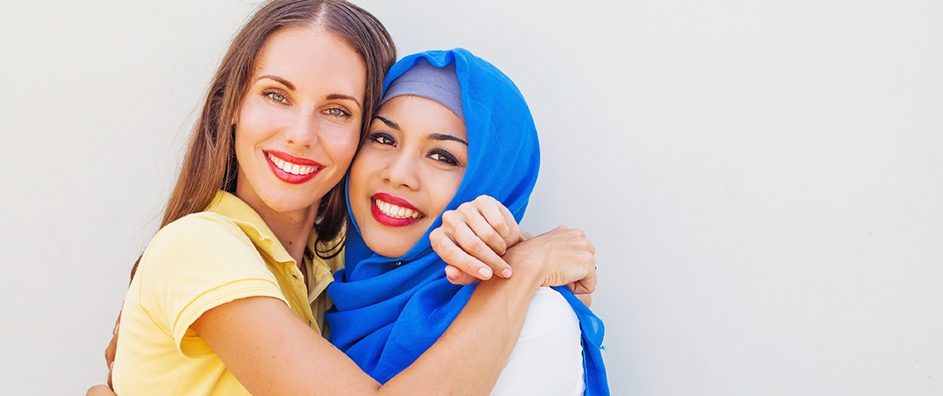
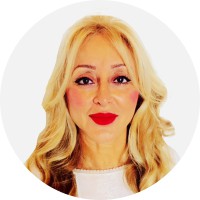
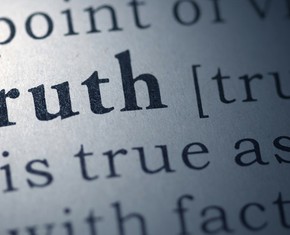
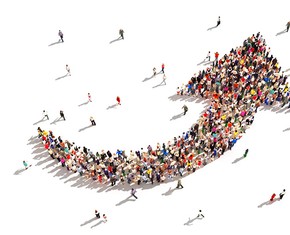
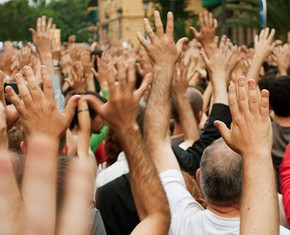



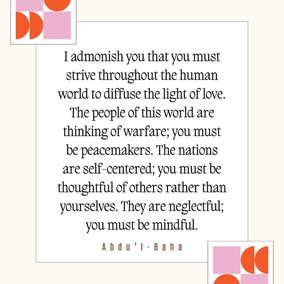
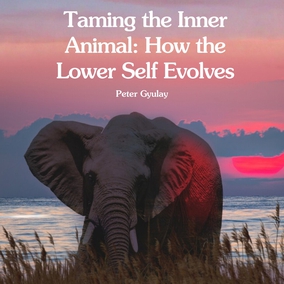
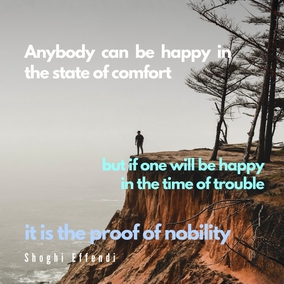
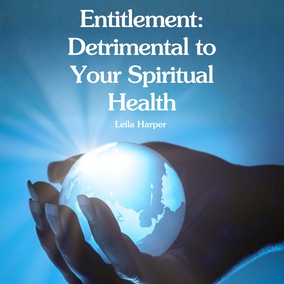
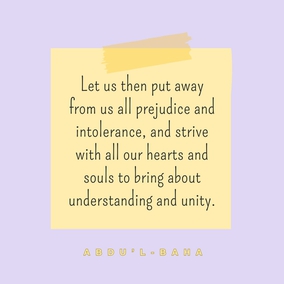

" This is a new cycle of human power. All the horizons of the world are luminous, and the world will ...become indeed a garden and a paradise. It is the hour of unity of the sons of men and the drawing together of all races and all classes. You are loosed from ancient superstitions that have kept men ignorant and have destroyed the foundation of true humanity. The gift of God to this enlightened age is the knowledge of the oneness of mankind and the fundamental oneness of religion..."